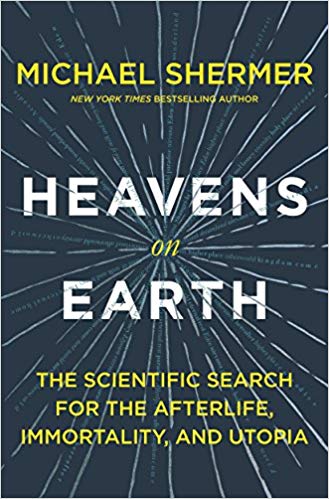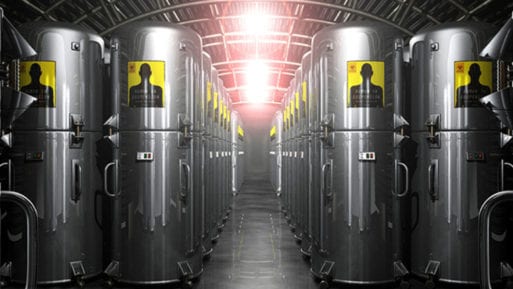 Since time immemorial, humans have grappled with the question: Does an afterlife really exist? Not one of the approximately 101 billion people who have lived and breathed on this Earth has ever come back from the dead to give us the answer. Yet belief in an immortal soul that lives on after the body dies is a basic tenet of virtually every religion, philosophy and culture that has ever existed or exists today. One has to wonder why. What binds us so tightly to the belief that this life can’t be all there is? Why do we so readily accept the unprovable as true? That’s one of many questions Micheal Shermer tries to answer in his ambitious and thoroughly engaging book, “Heavens on Earth.”
Since time immemorial, humans have grappled with the question: Does an afterlife really exist? Not one of the approximately 101 billion people who have lived and breathed on this Earth has ever come back from the dead to give us the answer. Yet belief in an immortal soul that lives on after the body dies is a basic tenet of virtually every religion, philosophy and culture that has ever existed or exists today. One has to wonder why. What binds us so tightly to the belief that this life can’t be all there is? Why do we so readily accept the unprovable as true? That’s one of many questions Micheal Shermer tries to answer in his ambitious and thoroughly engaging book, “Heavens on Earth.”
Shermer, a scientist, journalist and professional skeptic, starts his quest by examining how humans think about and approach death. How much does the fear of death fuel our desire to believe that there is “something more”? And what do our attitudes about the afterlife contribute to this belief? Does religiosity, specifically the fear of divine retribution or the anticipation of heavenly reward, make us more death averse — more willing to believe that we never really die? It’s a fascinating approach and one that allows the reader to follow Shermer’s reasoning to its logical conclusion — that scientific proof of an afterlife doesn’t (and never can) exist.

Dr. Michael Shermer is the founding editor of Skeptic Magazine and the host of the Science Salon Podcast
Credit: lifelessons.co
Shermer taps into the writings of some of the world’s greatest thinkers to make his case, even using passages from the Bible to illustrate the point that our visions of the afterlife tend to be geographically linked. The ancient Hebrews, for example, wrote of heaven as a lush tropical paradise where “milk and honey” flowed, a stark contrast to the day-to-day reality of their harsh desert lives. The Inuit people of Alaska, on the other hand, completely rejected the Christian view of heaven because it contained no seals for them to hunt. “Heaven” is so subjective, in fact, that it seems at the very least implausible that it exists in any objective way.
Shermer also takes on the issue of near-death experiences or NDEs, which many people — including NDE researcher Sam Parnia, claim are “proof” of life, or at least consciousness, after death. Using Hume’s maxim as a guiding principle, he dissects multiple accounts of NDEs, concluding that (a) nearly dead is not the same as dead, and (b) the accounts of NDE experiencers are likely caused by the abnormal firings of an oxygen-deprived brain rather than a journey to the other side.
“…In point of fact, NDE narratives vary considerably, especially across cultures, most notably between Western and Eastern traditions. In India, for example, NDEs rarely include out of body experiences, or the sensation of passing through a tunnel, or a life review…Instead, what we seem to have is exactly what we would expect to see if NDEs were the product of the inner workings of the brain. Chritsians see the figure of Jesus, Hindus see Yamraj and his minions, children’s NDEs often seem much more simplistic than those of adults, etc…”
Immortality of the Body?
After tackling the spiritual quest for immortality, Dr. Shermer moves on to what may be the most fascinating part of “Heavens on Earth” — the quest for physical immortality as it is playing out in laboratories and board rooms today. From the relatively “old” science of cryonics (freezing one’s body or brain in liquid nitrogen in the hopes that it can someday be revived), to “mind-uploading” (creating a computer-generated “self”), to eternal life in a Matrix-like virtual reality indistinguishable from the “real thing,” researchers are working feverishly to uncover a way to permanently cheat death. And while there is absolutely no proof that any of these ideas will work, they make for captivating reading, if for no other reason than so many fabulously wealthy people are pouring money into them at an astronomical rate.

Cryonics is a life-extending technology that preserves the dead in the hopes of reviving them at a later time
Credit: gizmodo.com
America’s tech billionaires, in particular, seem consumed by the idea of eternal life — or something close. Larry Ellison, the former CEO of Oracle, for example, has poured over $450 million into anti-aging research. And PayPal founder and hedge fund manager Peter Thiel created Breakout Labs to fund start-ups that are working on developing a cure for aging and death. And then there are Google founders Larry Page and Sergey Brin, who created the start-up Calico in the hopes of developing technology that will increase the human lifespan to over 200 years.
Shermer holds out little hope that any of these technologies will deliver on their promises, at least not for a very long time.
In my opinion, the problems of aging and artificial intelligence are orders of magnitude harder than anyone anticipated decades ago when these fields began.
Utopia, Politics and Meaning
The last chapters of “Heavens on Earth” are the most philosophical, though no less lacking in detail and supporting logic than those that come before. In them, Michael Shermer looks at the reasons why humans tend to view their situations as worse than they actually are and how this skewed view of reality leads us to search for political and social solutions that turn disastrous in the end. He examines the fallacies inherent in identity politics, the rise of white nationalism, and the inevitability of Donal Trump. Lastly, he talks about why we die — why we must die — and how to find meaning right here on planet Earth. Then he sums it all up in a brilliant last paragraph that ends with these words:
Once born, we are each unique, a concatenation of genes and brains with thoughts, feelings, memories, histories and points of view that can never be duplicated, here or in the hereafter. Our sentence — yours, mine, everyone’s — is ours alone and like no other anywhere in the cosmos. We are given this one chance to live, some four score trips around the sun, a brief but glorious moment in the cosmos drama unfolding on this provisional proscenium. Given all that we know about the universe and the laws of nature, that is the most any of us can reasonably hope for. Fortunately, it is enough. It is the soul of life. It is heaven on earth.
“Heavens on Earth” is an important book. Detailed and erudite but also eminently readable, it explores not just life and death, but the human condition — why we are who we are and what makes us tick. It’s most definitely written from the point of view of a skeptic and thus might not appeal to those who have a strong religious faith. But it also leaves a lot of room for wonder. And its overarching message is one of hope for what’s to come.

 “Heavens on Earth” by Michael Shermer
“Heavens on Earth” by Michael Shermer


 How Dare You Die Now!
How Dare You Die Now!
 Debating Medical Aid in Dying
Debating Medical Aid in Dying
 “Help Me, Helen”
“Help Me, Helen”














